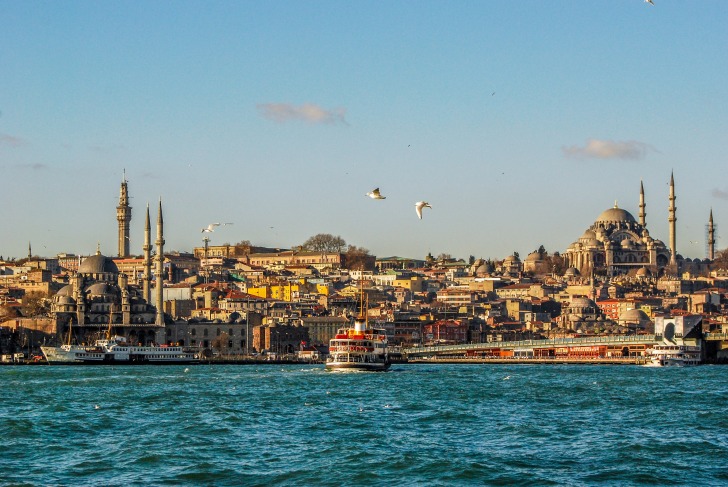Turkey, also known as the Republic of Türkiye, or just simply Türkiye, is a country with a very unique location.
Part of the country lies in Asia while the other part lies in Europe.
It has a rich and lustrous history and is well-known for the Ottoman Empire, which invaded and conquered many other countries during the second great expansion period.
The question many people wonder about is whether it is worth it to move to Turkey.
In this article, we will consider some of the advantages and disadvantages of living in Turkey.

Contents
Pros of living in Turkey
1. Cost of living
One of the first things most people consider is the cost of living in a particular country, as this will have a significant effect on their standard of living and mental well-being.
And, one of the biggest contributors to the cost of living is housing.
When you compare the cost of living in Turkey to that of the United States, or even some western European countries, it’s easy to understand why many people flock to this country.
The average cost of living for a family of four, without rent, is approximately $1,286 (23,967TL) per month.
The cost for a single person, without rent, is $368 (6,850TL).
The cost of living in Turkey is 60.97% lower than in the US and the rental cost is 85% lower than in the US.
On average, you’re looking at $65 for utilities for a small to medium-sized apartment or home.
A quart of milk will cost you approximately a dollar.
Overall, your expenses such as utilities, food, and entertainment are much lower than in most of Europe when you live in Turkey.
2. Good healthcare
Another factor that may drive up the cost of living is healthcare.
We all get sick from time to time and unexpected emergencies can drain your savings.
What you want to be reassured about is that the healthcare system will be able to meet your needs and offer good, quality healthcare.
The healthcare system is quite good in Turkey.
Especially in bigger cities.
However, if you are a foreigner, you will need to acquire healthcare from a private provider or apply for universal health insurance.
Foreigners are required to have healthcare in order to obtain and be legally permitted to work in Turkey.
However, when purchasing private healthcare, you can rest assured that you will get the same great quality of healthcare that citizens get on their government-funded plans.
Universal healthcare doesn’t quite offer the same benefits as private healthcare, but it is still quite comprehensive.
The wait times are longer, especially at private hospitals, and you will need to have lived in Turkey for approximately a year before you can apply for universal health insurance.
The cost changes every year but it is currently around $5.
Private health insurance is offered by insurance companies.
3. The people are friendly
Generally speaking, Turkish people are very friendly and helpful.
The Turks are well known for their hospitality.
You’ll often hear about visitors who’ve had an amazing experience through the hospitality of a Turkish person.
They are excellent cooks and love to share great experiences around the dinner table eating delicious food.
Turkish people sure do know how to whip up a great meal.
High emphasis is placed on friendship in this country and Turkish people are especially close to their friends.
Turkish people also place high importance on family and taking care of family.
You’ll often be invited into their home to share in their culture and history.
They are very proud of their country and love to share with foreigners.
4. Large ex-pat community
There is a very large ex-pat community of travelers from all four corners of the globe.
There are, currently, approximately 325,000 foreigners living in Turkey.
Many of these foreigners live in Istanbul, the most populated city in the country.
In addition, the Turkish government has unwaveringly welcomed asylum seekers from Syria with nearly 3.2 million Syrians calling Turkey their home.
The best part of having a large ex-pat community is the fact that it comes with a large support system.
For example, there are many Facebook groups for foreigners from different countries living in Turkey.
There are also many meet-ups, where these ex-pats can meet up and share their experiences in Turkey.
Another example is the website group, Internations.
5. Great weather
The winters are quite mild. Turkey is located in both the eastern and southern hemispheres.
Some areas do experience snow. But, for the most part, the winters are quite mild.
The climate differs in different areas of the country.
For example, if you live close to the Aegean Sea and the Mediterranean Sea, you’ll experience a very mild climate which is described as a hot-summer Mediterranean climate.
In this region, the winters are wet, mild, and cool, while the summers are hot and dry.
On the other hand, you’ll experience a temperate oceanic climate if you live in the coastal regions that border the Black Sea.
These summers are warm and wet and the winters are cool to cold and wet.
And, other regions will have a combination of a temperate Mediterranean climate and a temperate Oceanic climate, such as areas close to the Sea of Marmara.
6. Low crime rate
Crime is a significant concern for many.
Luckily, you shouldn’t be too concerned about crime in most parts of Turkey.
Pickpockets are a concern at major tourist attractions, and there have been warnings regarding unsafe areas, especially those close to the Syrian border, where kidnappings by terrorist groups are a major concern.
But, for the most part, Turkey is a fairly safe country, especially for women traveling alone.
Keep in mind, as a foreigner, you are required to keep your passport on you at all times.
And, with pickpocketing a concern, you may want to invest in a cross-body bag.
Furthermore, you are 78% safer in Turkey than in the US when it comes to violent crime and, overall, nine times safer in Turkey than in the US.
7. Delicious food
We’ve mentioned earlier that Turkish people are great cooks.
The truth is, Turkish food is absolutely delicious and very flavorful.
The secret to this is that their food is made with very fresh ingredients, and is very healthy.
There really is no secret ingredient, just very fresh ingredients, delicious spices, and simple recipes.
Examples include kebabs and stuffed grape leaves (dolma).
8. Outdoor living
Thanks to the great weather, most of the year, many Turks enjoy spending time outdoors going on picnics, going to the beach, or taking one of the many hiking trails found around the country.

Cons of Living in Turkey
1. Internet
Turkey’s internet is censored.
This means you may not always be able to access websites from back home.
For example, websites like Facebook, Youtube, and Twitter are constantly being blocked and censored.
2. Culture shock
If you are a westerner or live in any of the northern or western parts of Europe, you should expect to experience culture shock.
There will always be culture shock when moving to a foreign country, but this is especially true with Turkey, where the culture and norms are quite different from what westerners are used to.
For example, westerners tend to get to the point and may outright say no to a request.
This is considered rude in Turkey.
Turks won’t just say no, you can expect a very roundabout response.
This may frustrate westerners.
In addition, catcalling does occur and sexual harassment of foreign women in Turkey is a sad reality.
3. English is a barrier
English is widely spoken in most metropolitan cities, but this is not always the case in more rural areas.
If you enjoy traveling, you may find it a challenge to communicate with the locals who only speak Turkish.
This may cause more culture shock.
4. Jobs and work permits
Off the bat, getting a job or work permit may prove to be a challenge in Turkey.
In order to start working, you will need a work permit which you cannot get without first securing a job.
This in and of itself is a challenge.
Most jobs are reserved for Turkish people or those that speak Turkish fluently.
If you do manage to get a job, which may take weeks or months before you get a response from an employer, you can expect to be paid less than a Turkish person doing the same job.
In addition, bureaucracy makes getting a work permit a painfully slow process.
5. Currency
If you plan to go to Turkey to save up some money, you are going to be disappointed.
The Turkish Lira isn’t worth much in other countries.
You may be able to save, but you won’t be able to do much with it in other countries.
6. Terrorism
While most of Turkey is pretty safe, the same can’t be said about the Turkish/Syrian border.
The threat of terrorism and kidnappings is very real.
These areas are considered to be extremely dangerous and visitors/ex-pats are kindly wanted to steer clear of these areas.
7. Imported Goods
Buying imported goods can be quite expensive.
While most local items are relatively inexpensive, when it comes to imports, it’s a different matter.
This is largely due to high import taxes.
So, imported cars and electronics are going to cost you a pretty penny.
8. Negotiation
Negotiation is a big part of Turkish culture and everything from food prices to housing is up for negotiation.
Most westerners aren’t too comfortable with this concept and may prefer to get an outright price when it comes to housing.
If you feel uncomfortable negotiating, ask the estate agent to do this on your behalf.
While this may seem like a negative, it can also be a positive as you can expect to haggle up to 30 to 40% in high tourist areas.
You may even score a bargain.
Pros and Cons of Living in Turkey – Summary Table
| Pros of living in Turkey | Cons of Living in Turkey |
|---|---|
| 1. Cost of living | 1. Internet |
| 2. Good healthcare | 2. Culture shock |
| 3. The people are friendly | 3. English is a barrier |
| 4. Large ex-pat community | 4. Jobs and work permits |
| 5. Great weather | 5. Currency |
| 6. Low crime rate | 6. Terrorism |
| 7. Delicious food | 7. Imported Goods |
| 8. Outdoor living | 8. Negotiation |
Turkey Safety Overview
READ THE FULL REPORT: Turkey Safety Review
Safety Index:
- OVERALL RISK: HIGH
- TRANSPORT & TAXIS RISK: LOW
- PICKPOCKETS RISK: MEDIUM
- NATURAL DISASTERS RISK: LOW
- MUGGING RISK: MEDIUM
- TERRORISM RISK: HIGH
- SCAMS RISK: MEDIUM
- WOMEN TRAVELERS RISK: MEDIUM
Frequently Asked Questions
Can foreigners buy property in Turkey?
Yes, provided that it is in a city and not a village or rural area.
How long can you stay in Turkey if you own a property?
Regardless if you own property or not, foreigners may live in Turkey for 90 out of 180 days of the year.
Is it OK to haggle in Turkey?
Yes, it is part of the culture.
What is the most visited place in Turkey?
Istanbul.
What kind of tourism is famous in Turkey?
Historical sites and seaside resorts.












Well, I have been living in Turkiye for nearly 10 years and would like to say the majority of information mentioned above is accurate, except the info about the overall risk, which this article sets as high. Turkiye is in fact a very safe country thanks to a very efficient police force and intelligence. I live near the Syrian border and can confirm that not a single tourist or foreigner was kidnapped or got in trouble. The border area is very well guarded by thousands of policemen, gendarmerie, soldiers, and intelligence. Overall Turkiye is very safe to visit or to live in.
Thank you for your comment and clarification. I am considering Türkiye for retirement. I am a professor and will plan to visit soon.
I live in turkey in 13 year and I Embarrassment the article but the article is real. (small note=every risk level is HİGH)